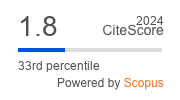Studi Komparasi Model Klasifikasi Berbasis Pembelajaran Mesin untuk Sistem Rekomendasi Program Studi
Abstract
Selecting a major can be quite difficult for prospective college students. The choice may have an effect not only on their academic life, but also on their career path. Due to some restrictions as the impact of the COVID-19 pandemic, universities must find novel ways to reach prospective students and assist them in choosing their majors, one of which is a college major recommendation system. This system can assist prospective students in determining the most appropriate majors for them based on data from the current students. Unlike other existing systems that employ either a rule-based or fuzzy model, this study employs a machine learning approach using data from undergraduate students at Universitas Islam Indonesia. This paper aims to compare several clustering models (i.e., K-means, Agglomerative, Birch, and DBSCAN) for the purpose of categorizing current students, to which the results will be used for classification purposes using various approaches (i.e., single stage vs. multistage), algorithms (i.e., multinomial logistic regression, random forest, and support vector machine), and scenarios (i.e., with or without GPA-based label). Our findings indicate that the K-means model outperformed all other clustering models and that the single stage with random forest classification model performed the best across all scenarios.
Downloads
References
A. Andriani, “Sistem Pendukung Keputusan Berbasis Decision Tree Dalam Pemberian Beasiswa Studi Kasus : Amik ‘ BSI Yogyakarta ,’” Seminar Nasional Teknologi Informasi dan Komunikasi 2013 (SENTIKA 2013), vol. 2013, no. SENTIKA, 2013.
J. Bobadilla, F. Ortega, A. Hernando, and A. Gutiérrez, “Recommender systems survey,” Knowledge-Based Systems, vol. 46, 2013, doi: 10.1016/j.knosys.2013.03.012.
C. Cortes and V. Vapnik, “Support-Vector Networks,” Machine Learning, vol. 20, no. 3, 1995, doi: 10.1023/A:1022627411411.
M. Ezz and A. Elshenawy, “Adaptive recommendation system using machine learning algorithms for predicting student’s best academic program,” Education and Information Technologies, vol. 25, no. 4, 2020, doi: 10.1007/s10639-019-10049-7.
G. DS and K. K, “Developing an Intelligent Recommendation System for Course Selection by Students for Graduate Courses,” Business and Economics Journal, vol. 7, no. 2, 2015, doi: 10.4172/2151-6219.1000209.
Y. Isler, A. Narin, M. Ozer, and M. Perc, “Multi-stage classification of congestive heart failure based on short-term heart rate variability,” Chaos, Solitons and Fractals, vol. 118, 2019, doi: 10.1016/j.chaos.2018.11.020.
D. Kancherla, J. D. Bodapati, and N. Veeranjaneyulu, “Effect of different kernels on the performance of an SVM based classification,” International Journal of Recent Technology and Engineering, vol. 7, no. 5, 2019.
J. A. Konstan and J. Riedl, “Recommender systems: From algorithms to user experience,” User Modeling and User-Adapted Interaction, vol. 22, no. 1–2. 2012. doi: 10.1007/s11257-011-9112-x.
S. B. Kotsiantis, “Supervised machine learning: A review of classification techniques,” Informatica (Ljubljana), vol. 31, no. 3. 2007. doi: 10.31449/inf.v31i3.148.
L. D. Kumalasari and A. Susanto, “Recommendation System of Information Technology Jobs using Collaborative Filtering Method Based on LinkedIn Skills Endorsement,” SISFORMA, vol. 6, no. 2, 2020, doi: 10.24167/sisforma.v6i2.2240.
C. Kwak and A. Clayton-Matthews, “Multinomial logistic regression,” Nursing Research, vol. 51, no. 6, 2002, doi: 10.1097/00006199-200211000-00009.
E. Marbun and S. Hansun, “Sistem Pendukung Keputusan Pemilihan Program Studi Dengan Metode Saw Dan Ahp,” ILKOM Jurnal Ilmiah, vol. 11, no. 3, 2019, doi: 10.33096/ilkom.v11i3.432.175-183.
A. Mendes, J. Togelius, and L. dos Santos Coelho, “Multi-stage transfer learning with an application to selection process,” in Frontiers in Artificial Intelligence and Applications, 2020, vol. 325. doi: 10.3233/FAIA200291.
Jpnn.com, “Hasil Survei: 87 Persen Mahasiswa Pilih Jurusan Tidak Sesuai Minat,” jpnn.com, 2019.
M. R. Okaviana and R. Susanto, “Sistem Pendukung Keputusan Rekomendasi Pemilihan Program Studi Menggunakan Metode Multifactor Evaluation Process Di Sma Negeri 1 Bandung,” Komputa : Jurnal Ilmiah Komputer dan Informatika, vol. 3, no. 2, 2014, doi: 10.34010/komputa.v3i2.2389.
M. Pal, “Random forest classifier for remote sensing classification,” International Journal of Remote Sensing, vol. 26, no. 1, 2005, doi: 10.1080/01431160412331269698.
A. Parameswaran, P. Venetis, and H. Garcia-Molina, “Recommendation systems with complex constraints: A course recommendation perspective,” ACM Transactions on Information Systems, vol. 29, no. 4. 2011. doi: 10.1145/2037661.2037665.
S. Pare, “Sistem Pendukung Keputusan Pemilihan Program Studi Pada Perguruan Tinggi,” jurnal iImiah Mustek Anim Ha, vol. 2, no. 9, 2013.
Mrs. Leena. and Dr. Mohammed, “A Multistage Feature Selection Model for Document Classification Using Information Gain and Rough Set,” International Journal of Advanced Research in Artificial Intelligence, vol. 3, no. 11, 2014, doi: 10.14569/ijarai.2014.031103.
H. S. Permatasari, A. Suyatno, and A. H. Kridalaksana, “Sistem Pendukung Keputusan Pemilihan Program Studi Di Universitas Mulawarman Menggunakan Metode Tsukamoto (Studi Kasus : Fakultas MIPA),” Informatika Mulawarman : Jurnal Ilmiah Ilmu Komputer, vol. 10, no. 1, 2016, doi: 10.30872/jim.v10i1.19.
S. S. Poorna and G. J. Nair, “Multistage classification scheme to enhance speech emotion recognition,” International Journal of Speech Technology, 2019, doi: 10.1007/s10772-019-09605-w.
A. M. R. Pratama, R. R. Aryanto, and A. T. Pratama, “Model Klasifikasi Calon Mahasiswa Baru Untuk Sistem Rekomendasi Program Studi Sarjana Berbasis Machine Learning,” Jurnal Teknologi Informasi dan Ilmu Komputer (JTIIK). 2021.
I. Safutra, “Mahasiswa Mengaku Salah Jurusan, Banyak Sarjana yang Penting Lulus,” Dec. 15, 2019.
C. M. Salgado, M. P. Fernandes, A. Horta, M. Xavier, J. M. C. Sousa, and S. M. Vieira, “Multistage modeling for the classification of numerical and categorical datasets,” 2017. doi: 10.1109/FUZZ-IEEE.2017.8015665.
Copyright (c) 2021 Jurnal RESTI (Rekayasa Sistem dan Teknologi Informasi)

This work is licensed under a Creative Commons Attribution 4.0 International License.
Copyright in each article belongs to the author
- The author acknowledges that the RESTI Journal (System Engineering and Information Technology) is the first publisher to publish with a license Creative Commons Attribution 4.0 International License.
- Authors can enter writing separately, arrange the non-exclusive distribution of manuscripts that have been published in this journal into other versions (eg sent to the author's institutional repository, publication in a book, etc.), by acknowledging that the manuscript has been published for the first time in the RESTI (Rekayasa Sistem dan Teknologi Informasi) journal ;








